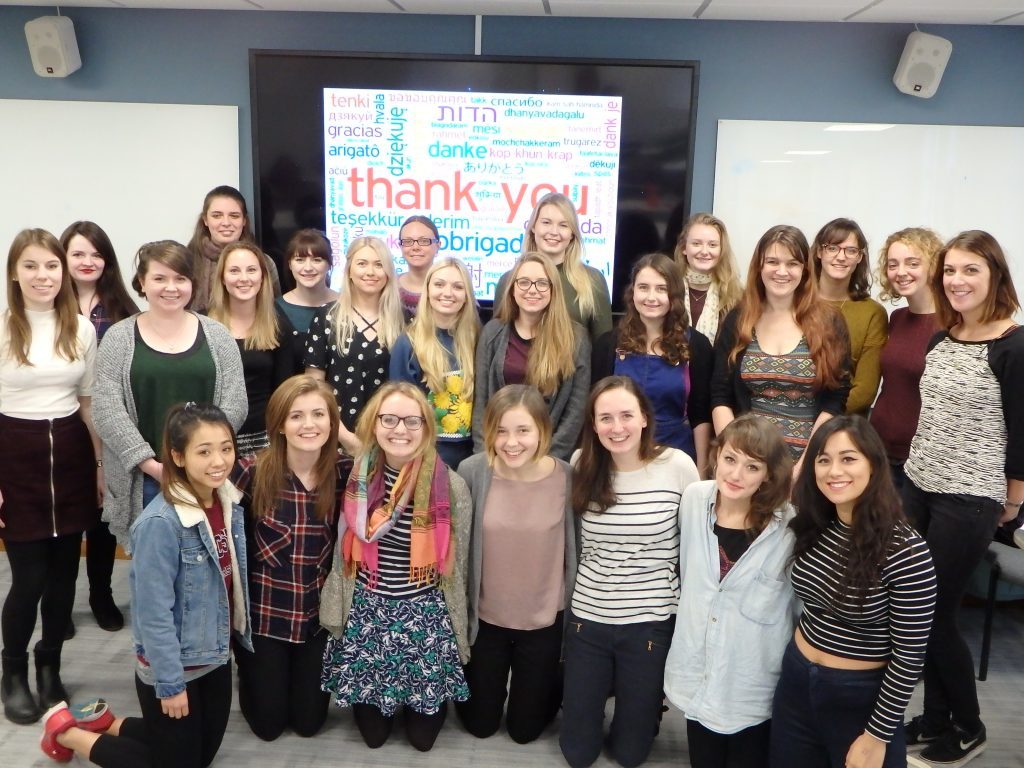Dr Helen Stringer, Senior Lecturer/Speech and Language Therapist
School of Education, Communication and Language Sciences
Humanities and Social Sciences
What did you do?
Introduced group seminar debates, interactive seminars run by individual students and a class book which includes essays from all students on the module.
Graduate Framework
This approach develops the following attributes:
- Critical Thinkers
- Confident
- Future focused
- Collaborative
- Curious
Staff can find out more about the Graduate Framework on the University intranet.
Who is involved?
Undergraduate students studying SPE4012 Professional Issues as part of the BSc Speech and Language Sciences.
Dr Helen Stringer, Module Leader.
A Speech and Language Therapist from the NHS.

BSc Speech and Language Sciences students
How did you do it?
The first few weeks of the module are delivered by me where I cover sessions on professional skills. We then move on to the group debates where groups of students research and debate a variety of legislation and policies from the NHS. The debates encourage students to think critically about legislation and they end up developing a lot of expertise in their topic area which is lovely to see.
Later in the module students will choose a topic that they would like to deliver an individual seminar about and write up as an essay for the class book. Students usually submit their top 4 topics to me and then I allocate the topics to make sure all areas are covered.
Options for the topic choices are thought about carefully and one of the main aims is to equip students with information that they will likely be asked about when they go for job interviews, as well as when they start their careers. Once topics have been allocated this is when it is up to the students to start using their research and creative skills. I do provide support during this time, especially when students are feeling anxious about delivering a seminar.
Students will deliver their 20 minute interactive seminar and then submit their essay for the class book the following day. One of the requirements is that they engage with all members of the group and it’s always exciting to see their approaches to this. Both elements are marked and contribute to 60% of the overall mark for the module. Myself and a NHS speech and language therapist will be in each seminar. Once I have marked this I give the students detailed feedback.
Before their work is included in the class book they have the chance to improve their essay. Their mark won’t change but this helps ensure a real high quality class book. We also include a mechanism for students to give feedback to each other. Last year we used OMBEA and this year I’m thinking of using on online survey.
Student Voice
‘Specific highlights of the module include the fact that its aim was to produce a handy resource regarding current issues in the field of speech and language therapy. This resource was bang up to date, and, we discovered, highly relevant to our future practice; I know it has since been used widely by my colleagues in preparation for interviews, and during clinical practice. Group and individual presentations on a wide variety of both lecturer and student chosen subjects were combined to collate this resource. The brief for these presentations stipulated that audience involvement was vital to receiving a good grade.’
Sarah Atkinson, Former Speech and Language Therapy Student
To read more about Sarah’s thoughts on the module take a look at her blog post.
Why did you do it?
When I took over the module it was assessed using an exam. I felt that given the content of the module and the focus on professional skills an exam was not the best way to assess the skills and knowledge that students developed. The remit of the module is so broad and information and policies are constantly changing so getting the students to investigate different issues so thoroughly results in a fantastic resource and great opportunities for peer learning. The class book is something students can keep referring to and I know that they find it useful when it comes to having interviews.
Does it work?
Students enjoy so many elements of this module including the ability to investigate important issues themselves and also the chance to learn from each other and develop interactive seminars. They develop a lot of confidence in their areas, there have even been occasions where they have spoken to senior colleagues in the Department of Health to ask questions.
I did receive a TEA award nomination, which is always nice, and the way feedback is provided to students was shared as an example of good practice across the Faculty.
I also love to see the ideas that students come up with and to me this demonstrates how engaged they are with the module. Seminars they have delivered include versions of Who Wants to Be a Millionaire, quizzes, role plays, videos based on I’m a Celebrity, news reports, cakes…. the list goes on. All students on the module benefit from this effort and creativity.
Another marker of success is the quality of the class book that is produced. Colleagues working in the NHS have been interested in the content as it really does include the most up to date knowledge and information on key policy areas. This is shared on the VLE so that students can easily access this.
I’m also proud of all students as they are very successful in terms of progressing to careers in Speech and Language Therapy. I hope that this module helps to contribute to their success.
Interested in finding out more
Find out detailed information about assessment on the LTDS website or get in touch with ltds@ncl.ac.uk if you would like any help or advice.
Contact details
Dr Hele n Stringer, School of Education, Communication and Language Sciences
n Stringer, School of Education, Communication and Language Sciences
